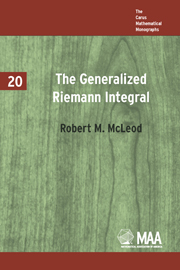Book contents
- Frontmatter
- PREFACE
- LIST OF SYMBOLS
- Contents
- INTRODUCTION
- CHAPTER 1 DEFINITION OF THE GENERALIZED RIEMANN INTEGRAL
- CHAPTER 2 BASIC PROPERTIES OF THE INTEGRAL
- CHAPTER 3 ABSOLUTE INTEGRABILITY AND CONVERGENCE THEOREMS
- CHAPTER 4 INTEGRATION ON SUBSETS OF INTERVALS
- CHAPTER 5 MEASURABLE FUNCTIONS
- CHAPTER 6 MULTIPLE AND ITERATED INTEGRALS
- CHAPTER 7 INTEGRALS OF STIELTJES TYPE
- CHAPTER 8 COMPARISON OF INTEGRALS
- REFERENCES
- APPENDIX Solutions of In-text Exercises
- INDEX
INTRODUCTION
- Frontmatter
- PREFACE
- LIST OF SYMBOLS
- Contents
- INTRODUCTION
- CHAPTER 1 DEFINITION OF THE GENERALIZED RIEMANN INTEGRAL
- CHAPTER 2 BASIC PROPERTIES OF THE INTEGRAL
- CHAPTER 3 ABSOLUTE INTEGRABILITY AND CONVERGENCE THEOREMS
- CHAPTER 4 INTEGRATION ON SUBSETS OF INTERVALS
- CHAPTER 5 MEASURABLE FUNCTIONS
- CHAPTER 6 MULTIPLE AND ITERATED INTEGRALS
- CHAPTER 7 INTEGRALS OF STIELTJES TYPE
- CHAPTER 8 COMPARISON OF INTEGRALS
- REFERENCES
- APPENDIX Solutions of In-text Exercises
- INDEX
Summary
The discussion of the definite integral in elementary calculus commonly starts from an area problem. Given a region under a function graph, how can its area be calculated? The sum of the areas of slender rectangles is a fairly natural approximation. A limit of such sums yields the exact area. When this process is stripped to its essentials the Riemann integral of a function over a given interval stands revealed.
Other geometric and physical quantities, such as volume and work, fit easily into the framework supplied by the concept of the Riemann integral. Moreover the link between the integral and the antiderivative is not hard to make. Thus students can be brought quickly to the evaluation of specific integrals in the context of interesting natural problems. These are among the reasons why the Riemann integral gets first attention when the integral concept is needed.
The Riemann integral has limitations, however. It applies only to bounded functions. The definition does not make sense on unbounded intervals either. Moreover a function which possesses a Riemann integral must exhibit a great deal of regularity. The need for regularity means that the convergence theorems for the Riemann integral are severely restricted. That is, the opportunity to integrate the limit of a sequence by calculating the limit of the sequence of integrals is scant.
Improper integrals are an elementary way to allow for the integration of some unbounded functions and for integration over unbounded intervals.
- Type
- Chapter
- Information
- The Generalized Riemann Integral , pp. 1 - 4Publisher: Mathematical Association of AmericaPrint publication year: 1980



